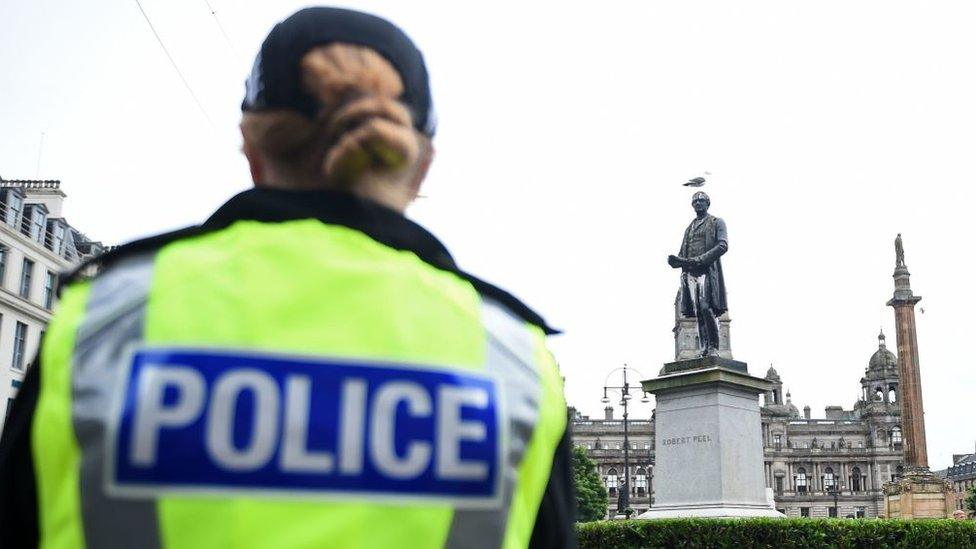Author Val McDermid says hate crime bill threatens free speech
- Published

The first minister has spoken on many occasions of her admiration for Val McDermid's books
The Scottish government's new hate crime legislation could "stifle" freedom of speech, according to one of Nicola Sturgeon's favourite authors.
Val McDermid is one of more than 20 writers, artists and comedians who have signed an open letter, external expressing their concern about the Hate Crime Bill.
They warn the "well meaning" proposals could have "unintended consequences" for artistic expression.
The government says the bill will offer greater protection to victims of hate.
And Justice Secretary Humza Yousaf insists that the government has been "absolutely explicit" that freedom of expression is not under attack.
But the open letter says the legislation could see people being prosecuted for "stirring up" hatred - even if they did not intend to do so.
It adds: "This offence could even be applied to being in possession of materials produced by someone else, where sharing the material could stir up hatred.
"The unintended consequences of this well meaning bill risk stifling freedom of expression, and the ability to articulate or criticise religious and other beliefs."
It has been signed by more than 20 individuals and organisations from the world of arts, journalism, literature, comedy, politics and human rights advocacy.
They include novelist Chris Brookmyre, actor Elaine C Smith, playwright Alan Bissett and comedian Rowan Atkinson.
The letter goes on to claim that the bill could "frustrate rational debate and discussion" in society, including in the arts.
It says: "The right to critique ideas, philosophical, religious and other must be protected to allow an artistic and democratic society to flourish."

The Scottish Police Federation is among the organisations to have criticised the proposals
The letter was organised by the Humanist Society Scotland, which has called on the bill to be amended to strike a "sensible balance" between protecting victims and safeguarding freedom of expression.
Its chief executive, Fraser Sutherland, said: "The failure of the bill to require intent to be proven in court on some offences risks a significant chilling effect on free expression."
Many opponents of the bill have drawn parallels with the highly-controversial Offensive Behaviour at Football Act, which was eventually repealed by the Scottish Parliament.
Libraries and bookshops
There have been suggestions, for example, that it could lead to author JK Rowling facing a seven-year prison sentence for expressing her concerns about the impact of trans rights on women.
There have also been concerns that the laws on possessing "inflammatory material" could even lead to libraries and bookshops being prosecuted for stocking books that are deemed to be offensive.
And the Scottish Police Federation has warned that the legislation would force officers to "police what people think or feel" which it says would "devastate the legitimacy of the police in the eyes of the public".
What does the Scottish government want to do?
Scotland already has various laws in place that offer additional protection to people from crimes based on their disability, race, religion, sexual orientation and transgender identity.
It means that crimes can be treated more seriously by the courts if the offender has shown "malice and ill-will" towards the victim based on their membership - or association with - one of the protected groups.
The Hate Crime and Public Order, external bill was introduced by the government in response to recommendations made by senior judge Lord Bracadale, who had been asked to examine the existing hate crime laws to make sure they were fit for purpose in the 21st Century.

The justice secretary insists the legislation has safeguards in place to protect freedom of speech
The bill aims to simplify and clarify the law by bringing together the various existing hate crime laws into a single piece of legislation, and adds hate crime based on a person's age to the list of protected groups.
It also creates a new crime of "stirring up hatred" against the protected groups - which is defined as "behaving in a threatening or abusive manner, or communicating threatening or abusive material to another person".
This can either be "with the intention" of stirring up hatred against someone from a protected group, or "where it is a likely consequence that hatred will be stirred up against such a group".
New offences of "possessing inflammatory material" are also created which covers people who "have in their possession threatening, abusive or insulting material with a view to communicating the material to another person."
Finally, the bill formally abolishes the offence of blasphemy - which has not been prosecuted in Scotland for more than 175 years.
The government says the bill "makes it clear to victims, perpetrators, and communities and to wider society that offences motivated by prejudice will be treated more seriously and will not be tolerated by society."
It has also said it will consider making changes to the bill before it is finally passed by parliament.
Mr Yousaf, the justice secretary, has insisted that the bill "will not prevent you expressing controversial or offensive views. Just don't do it in a threatening or abusive way that is likely or intended to stir up hatred."
Allow X content?
This article contains content provided by X. We ask for your permission before anything is loaded, as they may be using cookies and other technologies. You may want to read X’s cookie policy, external and privacy policy, external before accepting. To view this content choose ‘accept and continue’.
In a series of tweets, external, Mr Yousaf said it was not the case that someone could be prosecuted purely because someone else took offence at what they said.
And he said it would be for the courts to decide whether behaviour was threatening or abusive, and was likely or intended to stir up hatred.
Figures released in June, external showed that the number of people charged with hate crimes in Scotland has increased over the past year.
Racial offences remain the most commonly reported hate crime, with a total of 3,038 charges last year - an increase of 4% on the previous year, but still the second lowest since comparable records began in 2003/04 and 33% lower than the peak recorded in 2011/12.